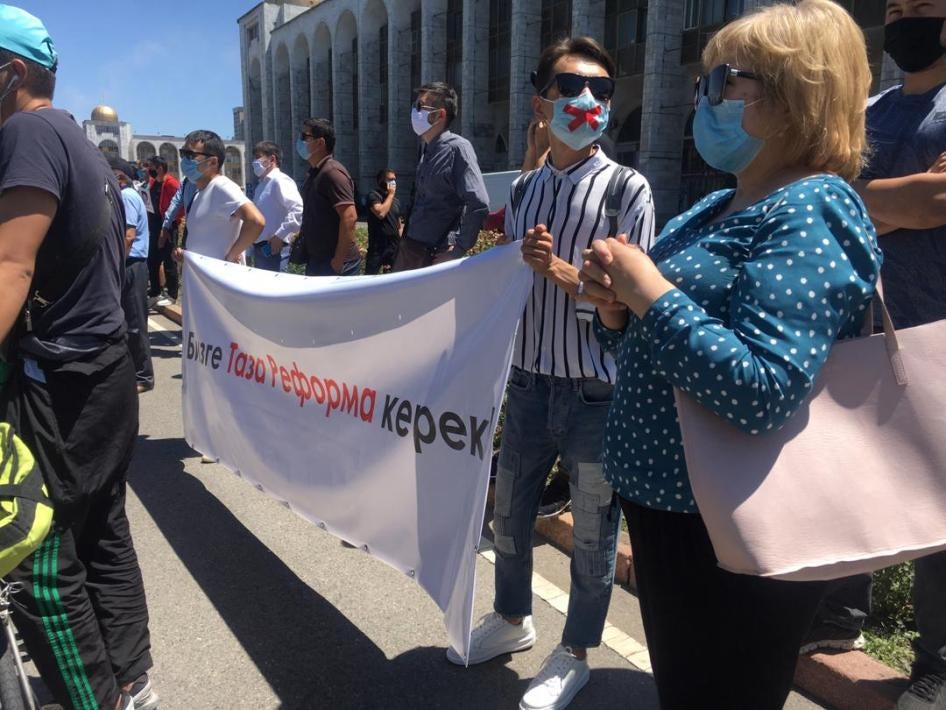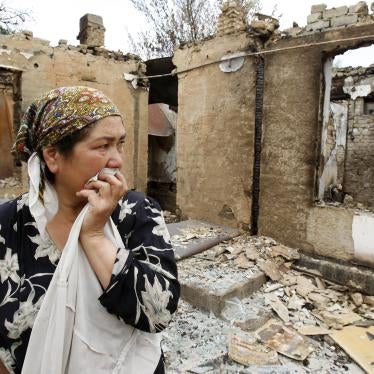(Berlin) – President Sooronbai Jeenbekov of Kyrgyzstan should veto two laws that are pending his signature on the grounds that they violate the country’s human rights obligations, Human Rights Watch said today.
Parliament on June 25, 2020 adopted a vague and overbroad law that allows the authorities, without judicial oversight, to order the removal of information officials consider “false” or “inaccurate” from internet platforms. Parliament also removed a provision from the Criminal Procedural Code that obligates Kyrgyz courts to reconsider criminal cases in which an international human rights body has found a violation.
“Given the vague wording and the lack of judicial oversight, the information law’s threat to freedom of speech and the media cannot be overstated,” said Mihra Rittmann, senior Central Asia researcher at Human Rights Watch. “Allowing this bill – or the amendments to the Criminal Procedural Code blunting the impact of international remedies – to enter into force would be a significant and regrettable step backward for Kyrgyzstan.”
The draft law prohibits websites and internet users from circulating “false” or “inaccurate” information online. While the law stipulates that the “authorized state body” can order websites or internet users to take down such information, it does not specify what should be considered “false” or “inaccurate.” The law also requires the “owners of website and/or webpages” to post their surname, initials, and their email address to receive “legally significant messages.” The law does not specify what, if any, the sanctions are for noncompliance.
Thousands of Kyrgyzstan’s citizens have voiced their opposition to the law on social media and hundreds of people participated in a protest march against the bill on June 29 in Bishkek.
The offense of circulating false or inaccurate information is so patently vague and overbroad that it can easily be misused to criminalize lawful speech protected by human rights law, Human Rights Watch said.
The law also offends the principle of legality which, under international human rights law, requires crimes to be classified and described with sufficient precision so that everyone is aware of what acts and omissions will make them liable and can act in accordance with the law.
The law should be rejected and new legislation considered that is compatible with international human rights law, Human Rights Watch said.
Any restriction on a right such as freedom of expression – or assembly and association – must not only serve a legitimate purpose but, as the United Nations Human Rights Committee has said, “They must also be necessary to protect them. Restrictive measures must conform to the principle of proportionality; they must be appropriate to achieve their protective function; they must be the least intrusive instruments amongst those, which might achieve the desired result; and they must be proportionate to the interest to be protected.”
Parliament also approved and sent to the president for signature amendments to the Criminal Procedural Code that, if signed into law, would make it more difficult for people in Kyrgyzstan to invoke and enforce international human rights norms.
An analysis by the Legal Clinic Adilet concluded that the law removes language stipulating that “international human rights treaties have direct effect and priority over other international treaties” and amends arts. 442 and 444 of the Criminal Procedure Code so that the rulings of international human rights bodies, such as the United Nations Human Rights Committee, no longer serve as grounds for reopening legal proceedings in domestic courts.
This follows amendments to Kyrgyzstan’s Constitution in 2016 that changed Kyrgyzstan’s legal system so that international human rights treaties no longer are either directly applicable by courts or have priority over other international agreements in Kyrgyzstan. The 2016 amendments also removed the government’s obligation to pay damages or make amends if an international rights body rules that it has violated human rights.
The pending amendments to the Criminal Procedural Code do not in any way alter Kyrgyzstan’s obligations to uphold its human rights commitments under international law, even if it makes implementation more difficult, Human Rights Watch said.
The initiative should nonetheless cause deep concern among Kyrgyzstan’s partners, including the European Union, as these regressive amendments signal an attempt to sidestep Kyrgyzstan’s rights commitments, Human Rights Watch said.
The EU is poised to sign an enhanced partnership and cooperation agreement with Kyrgyzstan and currently grants it trade preferences as a beneficiary of a special incentive arrangement under the EU’s Generalized Scheme of Preferences, tied to the country’s effective implementation of core international human rights conventions.
Kyrgyzstan’s parliament is also considering two other problematic draft laws that would violate international human rights norms and mar Kyrgyzstan’s rights record.
A draft law on nongovernmental organizations would impose unnecessary, burdensome financial reporting requirements on these groups that are incompatible with rights to freedom of association and expression.
Parliament is also considering a draft trade union law that would impose serious restrictions on workers’ rights to freedom of association and the right to organize. It would create a trade union monopoly, undermining the principle of trade union pluralism, and would greatly interfere with the right of trade unions to freely determine their own structures and statutes.
Both bills have been widely criticized domestically and internationally. Parliament was scheduled to consider both bills in June, but has not put either to a vote.
Kyrgyzstan is a party to the International Covenant on Civil and Political Rights, which guarantees the rights to freedom of expression, association, and assembly, including trade union membership and activities. It is also a member of the International Labour Organization, whose fundamental principles, including the right to organize, are binding on all members. All four of these draft laws go against Kyrgyzstan’s international commitments.
“It is a cause of deep concern that the Kyrgyz parliament is advancing not one, but four, rights-violating draft laws at the same time,” Rittmann said. “President Jeenbekov should decisively reject these bills, and show that despite the parliament’s efforts, Kyrgyzstan has not turned away from human rights and the rule of law.”
|
News Release
Kyrgyzstan: Bills Curbing Basic Freedoms Advance
President Should Use Veto to Uphold Fundamental Rights
Your tax deductible gift can help stop human rights violations and save lives around the world.
Region / Country
Topic
Most Viewed
-
November 25, 2019
A Dirty Investment

-
June 3, 2025
“They’re Ruining People’s Lives”

-
December 21, 2023
Meta’s Broken Promises

-
January 25, 2024
“We’re Dying Here”

-
February 19, 2018
“All We Want is Equality”





